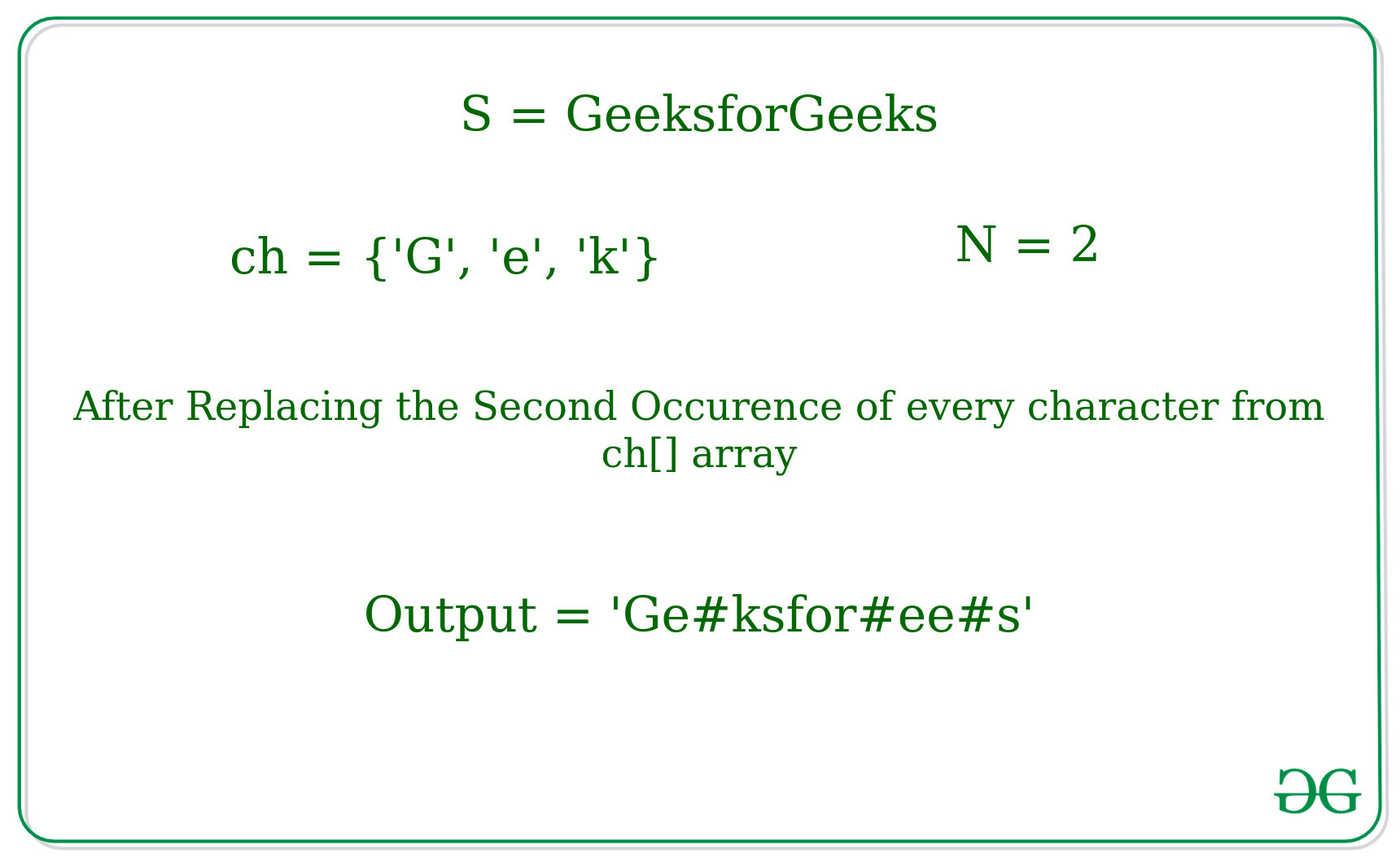Dado un String S , una array de caracteres ch[] , un número N y un carácter de reemplazo, la tarea es reemplazar cada enésima aparición de cada carácter de la array de caracteres ch[] en la string con el carácter de reemplazo dado.
Entrada: S = «GeeksforGeeks», ch[] = {‘G’, ‘e’, ’k’}, N = 2, replace_character = ‘#’ Salida: Ge#ksfor#ee#s Explicación:
en la
string
dada S, la segunda aparición de ‘G’, ‘e’, ’K’ se reemplaza con ‘#’
Entrada: S = abcdeahu, ch[] = {‘a’, ‘d’, ‘u’}, N = 1, replace_character = ‘#’ Salida: #bc#
eah #
Explicación:
En la string dada S, la primera la ocurrencia de ‘a’, ‘d’, ‘u’ se reemplaza con ‘#’
Método 1: Enfoque ingenuo
En este enfoque, la idea general es almacenar cada N-ésimo índice de ocurrencia de cada carácter en otra array y reemplazarlos con el otro carácter dado.
A continuación se muestra la implementación del enfoque anterior.
Python
# Python implementation to replace nth
# occurrence of the every character
# in a string
# Function to replace the Nth occurrence
# of the character of string
def replacer(initial_string, ch,
replacing_character, occurrence):
# breaking a string into it's
# every single character in list
lst1 = list(initial_string)
lst2 = list(ch)
# List to store the indexes in which
# it is replaced with the
# replacing_character
lst3 = []
# Loop to find the Nth occurrence of
# given characters in the string
for i in lst2:
if(lst1.count(i)>= occurrence):
count = 0
for j in range(0, len(initial_string)):
if(i == lst1[j]):
count+= 1
if(count == occurrence):
lst3.append(j)
for i in lst3:
# Replacing that particular index
# with the requested character
lst1[i] = replacing_character
print(''.join(lst1))
# Driver Code:
if __name__ == '__main__':
initial_string = 'GeeksforGeeks'
ch = ['G', 'e', 'k']
occurrence = 2
replacing_character = '#'
replacer(initial_string, ch,
replacing_character, occurrence)
Ge#ksfor#ee#s
Método 2: usar el método find()
En este enfoque, la idea es usar la función find() para encontrar la enésima ocurrencia del carácter en la string S dada y reemplazarla con otro carácter dador.
A continuación se muestra la implementación del enfoque anterior.
Python
# Python implementation to replace nth
# occurrence of the every character
# in a string using find() function
# Function to replace the Nth occurrence
# of the character of string
def replacer(initial_string, ch,
replacing_character, occurrence):
# breaking a string into
# it's every single character
lst1 = list(initial_string)
lst2 = list(ch)
# Loop to find the occurrence
# of the character in the string
# and replace it with the given
# replacing_character
for i in lst2:
sub_string = i
val = -1
for i in range(0, occurrence):
val = initial_string.find(sub_string,
val + 1)
lst1[val] = replacing_character
print(''.join(lst1))
# Driver Code:
if __name__ == '__main__':
initial_string = 'GeeksforGeeks'
ch = ['G', 'e', 'k']
occurrence = 2
replacing_character = '#'
replacer(initial_string, ch,
replacing_character, occurrence)
Ge#ksfor#ee#s
Método 3: Usando el método beginwith()
En este enfoque, la idea es usar la función beginwith() de python para encontrar el índice del carácter donde la ocurrencia del carácter es igual a la enésima ocurrencia dada y luego reemplazarla con la dado el carácter de reemplazo.
A continuación se muestra la implementación del enfoque anterior.
Python
# Python implementation to replace nth
# occurrence of the every character
# in a string
# Function to replace the Nth occurrence
# of the character of string
def replacer(initial_string, ch,
replacing_character, occurrence):
# breaking a string into
# it's every single character
lst1 = list(initial_string)
lst2 = list(ch)
# Loop to find the occurrence
# of the character in the string
# and replace it with the given
# replacing_character
for j in lst2:
sub_string = j
checklist = [i for i in range(0, len(initial_string))
if initial_string[i:].startswith(sub_string)]
if len(checklist)>= occurrence:
lst1[checklist[occurrence-1]] = replacing_character
print(''.join(lst1))
# Driver Code:
if __name__ == '__main__':
initial_string = 'GeeksforGeeks'
ch = ['G', 'e', 'k']
occurrence = 2
replacing_character = '#'
replacer(initial_string, ch,
replacing_character, occurrence)
Ge#ksfor#ee#s
Publicación traducida automáticamente
Artículo escrito por RISHU_MISHRA y traducido por Barcelona Geeks. The original can be accessed here. Licence: CCBY-SA
